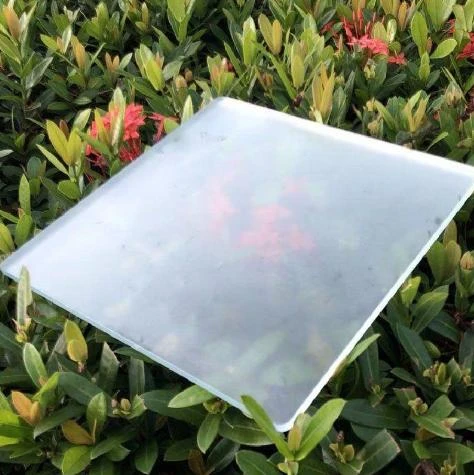The Versatile World of Toughened Float Glass A Comprehensive Overview
Toughened float glass, also known as tempered glass, has gained significant traction in various industries due to its remarkable properties and versatility. This specialized type of glass undergoes a rigorous manufacturing process that enhances its strength, making it ideal for numerous applications. Understanding toughened float glass involves delving into its production, characteristics, and the diverse environments in which it is employed.
The manufacturing of toughened float glass begins with the standard float glass process, where raw materials like silica sand, sodium carbonate, and limestone are melted together in a furnace. This molten glass is then floated on a bed of molten tin, resulting in a smooth, flat surface. The key differentiator comes into play during the tempering process, where the glass is heated to temperatures of around 620 degrees Celsius and then rapidly cooled. This quick cooling helps create compressive stress on the surface while maintaining tensile stress in the center, thereby increasing the glass's strength significantly—up to five times that of standard glass.
One of the standout properties of toughened float glass is its inherent safety feature
. When shattered, it breaks into small, blunt pieces rather than sharp shards, reducing the risk of injury. This characteristic makes it an ideal choice for environments where safety is paramount, such as in buildings, shower doors, glass partitions, and automotive applications. The glass is widely used in both residential and commercial construction, offering a combination of aesthetic appeal and safety.
toughened float glass
In addition to its safety features, toughened float glass is also highly resistant to thermal stress. This means that it can withstand sudden temperature changes without fracturing, making it suitable for applications such as glass facades in skyscrapers or in high-heat environments like pizza ovens. Its resilience also extends to exposure to environmental factors, such as UV rays and humidity, making it a durable choice for outdoors.
Moreover, toughened float glass can be customized in various sizes, shapes, and finishes, further enhancing its versatility. It can be coated or laminated to achieve desired aesthetics or energy efficiency. Many modern designs incorporate toughened glass not only for structural integrity but also for clarity and light transmission, contributing to an open and airy atmosphere in both commercial and residential spaces.
Sustainability is also a growing concern in the glass industry, and toughened float glass is no exception. It is fully recyclable and can be repurposed, which aligns with the increasing demand for environmentally friendly materials. Manufacturers are investing in processes that minimize waste and energy consumption during production, further boosting the glass’s appeal to eco-conscious consumers.
In conclusion, toughened float glass stands out as a remarkable innovation in material engineering. Its strength, safety, versatility, and sustainability make it an exceptional choice for a variety of applications, ranging from architectural design to automotive manufacturing. As technology advances and new applications are developed, the importance and prevalence of toughened float glass are likely to continue growing, solidifying its role as a cornerstone in modern construction and design.
 Afrikaans
Afrikaans  Albanian
Albanian  Amharic
Amharic  Arabic
Arabic  Armenian
Armenian  Azerbaijani
Azerbaijani  Basque
Basque  Belarusian
Belarusian  Bengali
Bengali  Bosnian
Bosnian  Bulgarian
Bulgarian  Catalan
Catalan  Cebuano
Cebuano  Corsican
Corsican  Croatian
Croatian  Czech
Czech  Danish
Danish  Dutch
Dutch  English
English  Esperanto
Esperanto  Estonian
Estonian  Finnish
Finnish  French
French  Frisian
Frisian  Galician
Galician  Georgian
Georgian  German
German  Greek
Greek  Gujarati
Gujarati  Haitian Creole
Haitian Creole  hausa
hausa  hawaiian
hawaiian  Hebrew
Hebrew  Hindi
Hindi  Miao
Miao  Hungarian
Hungarian  Icelandic
Icelandic  igbo
igbo  Indonesian
Indonesian  irish
irish  Italian
Italian  Japanese
Japanese  Javanese
Javanese  Kannada
Kannada  kazakh
kazakh  Khmer
Khmer  Rwandese
Rwandese  Korean
Korean  Kurdish
Kurdish  Kyrgyz
Kyrgyz  Lao
Lao  Latin
Latin  Latvian
Latvian  Lithuanian
Lithuanian  Luxembourgish
Luxembourgish  Macedonian
Macedonian  Malgashi
Malgashi  Malay
Malay  Malayalam
Malayalam  Maltese
Maltese  Maori
Maori  Marathi
Marathi  Mongolian
Mongolian  Myanmar
Myanmar  Nepali
Nepali  Norwegian
Norwegian  Norwegian
Norwegian  Occitan
Occitan  Pashto
Pashto  Persian
Persian  Polish
Polish  Portuguese
Portuguese  Punjabi
Punjabi  Romanian
Romanian  Russian
Russian  Samoan
Samoan  Scottish Gaelic
Scottish Gaelic  Serbian
Serbian  Sesotho
Sesotho  Shona
Shona  Sindhi
Sindhi  Sinhala
Sinhala  Slovak
Slovak  Slovenian
Slovenian  Somali
Somali  Spanish
Spanish  Sundanese
Sundanese  Swahili
Swahili  Swedish
Swedish  Tagalog
Tagalog  Tajik
Tajik  Tamil
Tamil  Tatar
Tatar  Telugu
Telugu  Thai
Thai  Turkish
Turkish  Turkmen
Turkmen  Ukrainian
Ukrainian  Urdu
Urdu  Uighur
Uighur  Uzbek
Uzbek  Vietnamese
Vietnamese  Welsh
Welsh  Bantu
Bantu  Yiddish
Yiddish  Yoruba
Yoruba  Zulu
Zulu 

